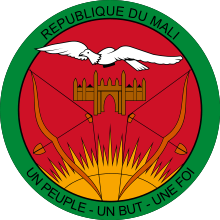Location
The Sudanese Republic and Senegal became independent of France in 1960 as the Mali Federation. When Senegal withdrew after only a few months, what formerly made up the Sudanese Republic was renamed Mali. Rule by dictatorship was brought to a close in 1991 by a military coup that ushered in a period of democratic rule. President Alpha KONARE won Mali's first two democratic presidential elections in 1992 and 1997. In keeping with Mali's two-term constitutional limit, he stepped down in 2002 and was succeeded by Amadou Toumani TOURE, who was elected to a second term in a 2007 election that was widely judged to be free and fair. Malian returnees from Libya in 2011 exacerbated tensions in northern Mali, and Tuareg ethnic militias rebelled in January 2012. Low- and mid-level soldiers, frustrated with the poor handling of the rebellion, overthrew TOURE on 22 March. Intensive mediation efforts led by the Economic Community of West African States (ECOWAS) returned power to a civilian administration in April with the appointment of Interim President Dioncounda TRAORE. The post-coup chaos led to rebels expelling the Malian military from the country's three northern regions and allowed Islamic militants to set up strongholds. Hundreds of thousands of northern Malians fled the violence to southern Mali and neighboring countries, exacerbating regional food shortages in host communities. An international military intervention to retake the three northern regions began in January 2013 and within a month most of the north had been retaken. In a democratic presidential election conducted in July and August of 2013, Ibrahim Boubacar KEITA was elected president. The Malian Government and northern armed groups signed an internationally-mediated peace accord in June 2015.
Mali is a semi-presidential republic.
Source: CIA World Factbook
Members:
Resources
Displaying 86 - 90 of 107Décret n°08-278 P-RM du 15 mai 2008 fixant les modalités de gestion du fonds national d’appui aux collectivités territoriales.
Le présent décret fixe les modalités de gestion du Fonds National d’Appui aux Collectivités Territoriales.
Arrêté n°05-0394/MEF-SG du 01 mars 2005 portant création et organisation d’un Comité National de Pilotage du Projet Fonds Italie- CILSS de Lutte contre la Désertification pour la Réduction de la Pauvreté au Sahel.
Le présent Arrêté crée un Comité National de Pilotage (CNP) du Projet Fonds Italie-CILSS Lutte contre la Désertification pour la Réduction de la Pauvreté au Sahel (LCD-RPS).Ce Comité comprend des représentants issus des structures gouvernementales; des ONG et Associations Nationales; et des Partenaires techniques et financiers.
Arrêté n° 09-1269-MATCL-SG du 02 juin 2009 fixant l'organisation et les modalités de fonctionnement de la cellule d'appui à la déconcentration-décentralisation de l'administration territoriale et des collectivités locales.
Le présent arrêté fixe l'organisation et les modalités de fonctionnement de la Cellule d'Appui à la Déconcentration-Décentralisation de l'Administration Territoriale et des Collectivités Locales (CADD/ATCL).
Ordonnance n°10-027/P-RM du 4 août 2010 portant création de l’Institut Polytechnique Rural de Formation et de Recherche Appliquée de Katibougou.
La présente Ordonnance crée l’Institut Polytechnique Rural de Formation et de Recherche Appliquée de Katibougou (IPR/IFRA) ayant pour mission la formation universitaire, post-universitaire et continue des cadres en matière de: la foresterie, l’halieutique, l’agroforesterie, les sciences du sol, l’agroéconomie, le génie rural, la médecine vétérinaire, la zootechnie et la vulgarisation agricole; la formation des communautés rurales; le perfectionnement d’auditeurs maliens et étrangers; la recherche scientifique et technologique; le développement et de diffusion des connaissances et savoir-fai
Décret n°2011-055/P-RM 10 février 2011 portant classement de la Mare Sanké et les Sites associés dans le Patrimoine culturel national .
Le présent décret classe la Mare Sanké et les sites associés dans le patrimoine culturel national du Mali.


